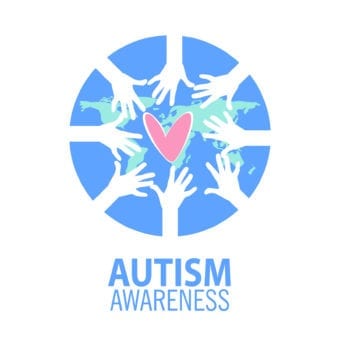The month of April is National Autism Awareness Month, and we aim to highlight the differences between autism and similar conditions. Autism is often diagnosed in childhood and carried on through adulthood, although adult diagnosis is becoming more common as more is learned about the autism spectrum. Parents of children diagnosed with autism report responses to environmental stimuli that include extreme reaction or a surprising lack of response to sensory input. The most recent numbers from the Centers for Disease Control indicate that autism affects 1 in 36 children and 1 in 45 adults today. More people are now being diagnosed because of the widespread awareness, education and tools designated to autism. In past decades, children still had this disorder, but were not being correctly diagnosed.
Conditions That Mimic Autism
Autism can often be mistaken for other mental health and behavioral disorders that share similar characteristics, such as social interaction and communication problems or a difficulty relating to people, things and events. Center for Discovery recognizes the prevalence of eating disorders throughout the community. Studies have shown that twenty to thirty percent of those with autism also have an eating disorder because of the correlation with routines, linear thinking and emotional regulation.
1. Obsessive-compulsive disorder (OCD)
The symptoms of OCD, such as compulsive hand washing, cleaning or touching items like doorknobs, can resemble the repetitive motions of autism. The key difference is that individuals with OCD often feel uncomfortable, bothered or tormented by their compulsions, while repetitive or intrusive thoughts don’t always bother people with autism. The impulses can even be a source of comfort to those with autism.
2. Antisocial personality disorder
Often called, sociopathy, this personality disorder is characterized by the pattern of disregarding or violating the rights of others. Individuals with an antisocial personality disorder will act against the social norms and break the rules and law resulting in reckless disregard for others. These individuals often lack empathy and are always in trouble with the law. They will lie and even practice physical violence against others. They have an underlying ulterior motive or agenda and often have experienced abuse, neglect or trauma in childhood. Individuals with autism may act against social norms; however, they do not carry an agenda or ulterior motive and do not have a history of childhood abuse or trauma.
3. Schizophrenia
This serious mental health disorder is characterized by incoherent or illogical thoughts, bizarre behavior, and speech and delusions or hallucinations, such as hearing voices. Both schizophrenia and autism involve cognitive and sensory-processing problems, both seem to run in families, and both include atypical brain development. However, individuals with autism do not have delusions or hallucinations, which are critical components of schizophrenia. Also, schizophrenia is usually diagnosed in adulthood where autism is currently most commonly diagnosed in childhood.
4. Learning Disorders
Learning disorders are a spectrum of disabilities that interfere with the three “R”s, reading, writing and arithmetic. While kids with autism will also struggle with learning, they are capable of intense focus and comprehension on a topic that interests them. Autism is a disorder of development that mainly involves social understanding, communication and repetitive routines or behaviors, including narrow and obsessive interests.
5. Attention Deficit Hyperactivity Disorder (ADHD)
There can be overlap in the symptoms of autism and ADHD such as difficulty focusing, hyperactivity and impulsivity. But while people with ADHD will resist order and repetition, these things can be comforting for a person with autism. A person with autism may be reluctant to speak or engage with others unless they are talking about a topic that interests them. With ADHD, a person will impulsively speak, often interrupting others.
Ready to take the first step towards healing and recovery? With Center for Discovery, you’re never alone in your journey to well-being! Once you complete treatment, you’ll have unlimited free access to our virtual support system Discovery for Life™. You’ll also get Discovery365™, a unique AI-powered 16-point interactive assessment and check-in program. With this revolutionary safety net, we use breakthrough, proprietary technology to intervene when you need additional support during the most crucial time in recovery within the first year.
Contact us today to speak confidentially with one of our caring admissions counselors and discover how you’ve always had the power within yourself to overcome life’s challenges!
More from Center for Discovery:
